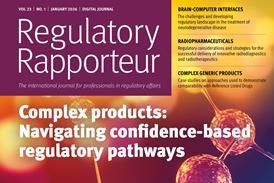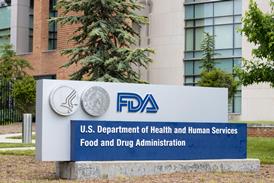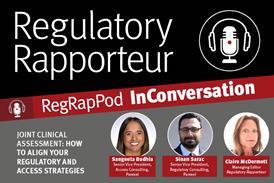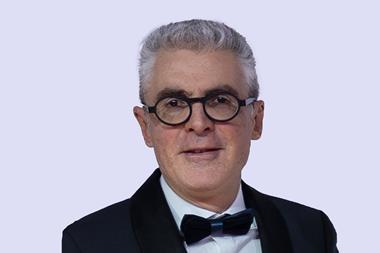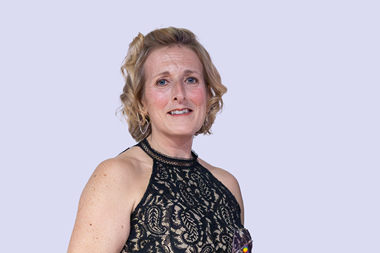Harriet Edwards, Director, Regulatory Affairs at Boyds, is part of the Boyds’ Podcast Team, UK and USA, who were finalists in the ‘Communication’ award category at the 2024 TOPRA Awards for Regulatory Excellence. In this interview, she discusses the vision for the podcast and the benefits of podcasts as a way of consuming key regulatory information.
Can you tell us a bit about Boyds’ main aims and vision and its areas of expertise?

Boyds is a global drug development consultancy, and we help our clients translate their ideas into cutting-edge medicines and treatments for the benefit of patients. Our vision is to improve patients’ lives by pioneering new approaches in the development of future medical treatments and technologies. We are particularly known for supporting the development of cell and gene therapies, but also have vast experience in biologicals and new chemical entities.
We work with a wide range of clients, from big pharma companies, through to small virtual companies, biotechs and medical device clients, all the way through to academic institutions. We have a wide range of clients, but ultimately we all have the same goal of benefitting patients in need.
Can you tell us a bit about your podcast?
Our podcast is used as an alternative way of communicating complex regulatory topics to a wide audience. The idea is to provide easy access to thoughtful, knowledgeable and insightful material to anyone that wants to listen to it. Although the target audience is people working within the regulatory affairs industry, it’s also aimed at people with a keen interest in, or knowledge of, drug development.
We curate the podcasts so that they’re bite-sized, usually less than 30 minutes, so that people can listen to an entire episode while they’re on their lunch break, driving somewhere, or walking the dog, for instance. Whatever it might be, it’s a way to take a break from your screen but still learn something interesting and useful. We try to deliver the podcast as if you’re listening to an informal conversation between your peers.
If you’re thinking about continued professional development (CPD), podcasts are also a really easy way to tick that off your list without having to read more material at your screen, which is sometimes a barrier for people wanting to broaden their horizons outside of their daily regulatory affairs activities. We aim to cover a wide variety of topics, so whether you’re an expert within a particular field, completely new to it, or whether you’re working in a different area such as quality assurance or business development, you could still get some benefit from listening. You may also gain some signposting for further in-depth research if you want to.
‘If we’re going to retain, nurture and grow current talent, …. we need to do that in a way that’s accessible and interesting.’
Where did the podcast concept come from? Was there a particular moment where you thought ‘There’s a better way for us to communicate this information’?
The concept for the podcast was multifactorial. I’m really passionate about regulatory affairs communication, and I think that if we’re going to retain, nurture and grow current talent, as well as attract new talent to the industry, we need to do that in a way that’s accessible and interesting. Reading complex information is great for some people to learn new information, but not for others.
I felt that a podcast would be a great way to connect with people on a personal level and really spread the word about regulatory affairs in a different way. I have a passion for regulatory communication, and podcasts are how I like to consume content generally, so it was a bit of a light bulb moment and hopefully people are seeing the benefit of us doing that.
What topics has your podcast covered?
The podcast aims to cover a broad range of complex topics within regulatory affairs and we try hard to make sure that there’s something for everyone. Although Boyds specialises in cutting-edge medicines, that’s not just what we would typically cover on the podcast. We recognise that there are so many other aspects of regulatory affairs that are incredibly important.
To date, the topics we’ve covered range from the regulation of novel, cutting-edge technology such as AI, which is very topical currently, to genome editing technologies – something I’m passionate about. But we’ve also covered more widely applicable subjects as well, such as EU regulatory filings. So, in this case, you’re receiving a crash course from real industry-leading experts within Boyds, who talk on ‘Regulatory 101’, if you like, for designations and filings. We cover the US as well. So, I think there’s something for everyone with an interest in regulatory affairs.
What is the breadth of your audience demographic?
We aim the podcast at industry professionals with a level of underlying knowledge, which enables us to dive into more complex information within 30 minutes. But there’s a broad pool of listeners, from people within the pharmaceutical industry, and scientists that are not necessarily in the pharmaceutical industry but are interested in drug development, through to regulatory professionals, but also staff from supporting services such as recruitment. In fact, we’ve had interesting feedback from recruiters, who are listening to understand more about the roles that they’re recruiting for. Our podcast makes them better informed and helps them find and attract the right candidates for the right roles, which is great to hear. People in finance within the drug development industry listen as well, and we’ve also received positive comments from lay members of the public.
In terms of geography, the podcast audience is global. While the majority of listeners are within the territories that Boyds works with (the UK, the EU and the US), there is also a really healthy proportion of listeners from other countries including Australia, Japan, Singapore, Tunisia, Canada and Switzerland, just to name a few.
You would perhaps expect mostly younger people to be listening to podcasts, but actually I read that there’s 500 million people that now have access to podcasts, and that spans all age groups. Because of the topics that we cover, our audience is those that have an interest in drug development or pharmaceuticals and so, by the very nature of that, they may be a bit more established in their career, because they want to do something outside of work that interests them within their field of knowledge and expertise. However, I do think it’s a way of attracting younger people and new talent into regulatory affairs because it’s a very accessible way of consuming content.
‘Every podcast that we put out is a really proud moment for the team.’
Have there been any ‘Wow’ moments or podcasts you’ve been particularly proud of?
That’s a difficult question to answer because each podcast we produce is very carefully thought through and highly researched. The guest speaker is usually the subject matter expert of the topic that we’re covering and so every podcast that we put out is a really proud moment for the team.
Having said that though, there are always proud moments when we receive positive feedback; it gives the whole team a real boost and reinforces that what we’re doing is a good idea. This is my brainchild and seeing it through to execution, and knowing that people are getting value from it, is a particularly proud moment for me personally.
However, if I had to pick something, I think it’s the unsolicited requests that we’ve had from industry experts and key opinion leaders to join us as guests on the podcast. We haven’t expanded our podcast to external experts yet but watch this space!
How do you pick the topics and are they a result of feedback that you’re getting?
The way we select podcast topics is now changing. To begin with, before we’d started receiving external feedback, it was very much an internal panel deciding what the regulatory ‘hot topics’ were. We’d look at what themes were coming up in literature, what was being talked about and what regulatory trends were on the horizon. So, every year we look at the emerging hot topics. AI, obviously, is one of them. Genome editing is another that’s very new and hasn’t yet had much written about it, so that’s another area of value.
But we also look at where the gaps are. For example, there’s a lot of information about regulatory designations on regulatory websites, but to distil all of that into a half-hour crash course for people is valuable.
So, while selecting new topics is still led by the original Boyds’ panel, people are feeding ideas to us as well, which is incredibly useful. If we have the expertise to be able to cover suggestions, they’re definitely added to the schedule.
We try and cover a variety of topics. While the majority of the podcasts we do have a regulatory focus, it’s not the only thing that we do at Boyds. We have medical writers, project managers and a medical team that’s really critical to our business, so we try and showcase those topics within drug development as well.
How do you think regulatory affairs will change in the next decade and what is your advice for staying up to date?
This is a really great question, and if I knew the answer to it, I’d be a very rich lady! Unfortunately, I don’t have a crystal ball, but what I see changing in regulatory affairs over the course of the next five years – not necessarily ten – is in more flexible and pragmatic approaches to cutting-edge technologies, which are becoming more mainstay in the way we treat patients these days. What was once a very strict and rigid framework to provide access to medicines to patients in need, is becoming a lot more flexible. And I think that will only increase.
I think the use of novel technologies, such as AI and genome editing, will become more commonplace. Being able to know how to regulate those products is going to keep you one step ahead. But regulatory affairs is such a huge, broad area and so much could change within the next ten years. After all, so much has changed in the last ten years already. Maybe that’s a topic for a future podcast episode!


